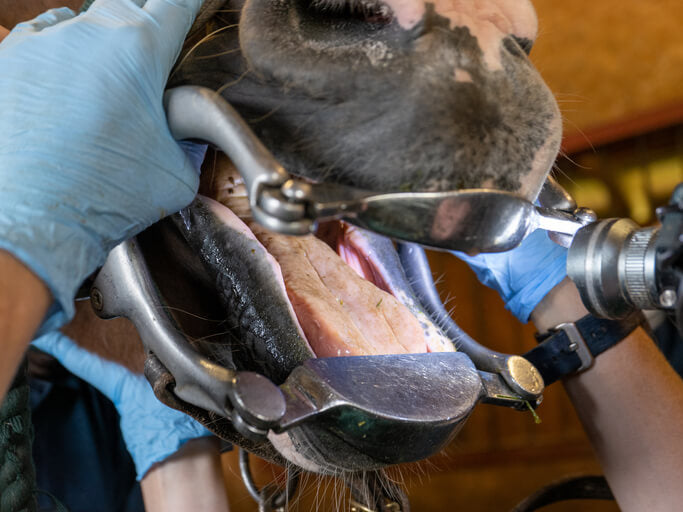USING A VETERINARIAN VS. EQUINE DENTISTRY
You notice one day that your horse seems to be dropping grain out of his mouth as he’s trying to chew, having undigested hay in his manure, maybe throwing his head when he is tacked up and acting up in general. These are all signs that he could have tooth discomfort and need his teeth floated.
Floating your horse’s molars is a necessary procedure because, as a horse’s teeth continue to erupt, the chewing surface may become jagged or sharp instead of flat and this will inhibit their ability to chew their food and start to cause discomfort when they chew.
Who should float your horse’s teeth? An equine dentist or your veterinarian?
As demand for proper oral care in the horse world has grown dramatically in the last twenty years, it is common to find non-veterinary equine dental technicians practicing in most areas of the country, but as demand increases, their practice has put them at odds with licensed veterinarians who believe equine dentistry is veterinary in nature and in the best interest of the horse’s welfare, should only be performed by an actual veterinarian.
Adding to the confusion, different states have enacted varying degrees of laws regulating dentistry. In a few states such as Texas and Oklahoma, only a licensed veterinarian may perform dental procedures. Other states require non-veterinary technicians to have a veterinarian on-site during any dental work. In Arizona and Virginia, dentistry can be performed under the indirect supervision of a veterinarian and several other states have no current restrictions on who practices equine dentistry. Many pending regulations are under review.
How do horse owners not only figure out what's best for their horse, but what's legal where they live? Ask your veterinarian. Since each state is different, your veterinarian (who is required to be licensed to practice in that state) should know what the rules and regulations are.

Advantages of using your veterinarian for your horse’s dental care:
- Your veterinarian has the advantage of already being familiar with your horse from regular visits.
- You have already established a relationship with your vet and he already knows what your horse’s issues are.
- You can often combine your horse’s dental visit with his other routine work.
- Your veterinarian is the only one who can administer any sedatives for procedures or prescribe medications that may be needed such as painkillers and antibiotics.
- Your veterinarian is a licensed professional who has had extensive education and can consider oral care as part of your horse’s overall health.
- If a serious dental issue is discovered, your veterinarian is capable of performing any necessary treatments or surgery.
- Your veterinarian is licensed, regulated and insured to practice veterinary medicine and are required to fulfill continuing education requirements and maintain certifications.
Advantages of using a non-veterinarian dental technician:
- Non-veterinary dental technicians have become common.
- Many of these individuals have developed great technical skill, are dedicated to their work, and use state-of-the-art equipment.
- Often, dental practitioners have attended some sort of technical training in equine oral care, some with "certification" from one of several independent equine dentistry courses, schools, or organizations, such as the International Association of Equine Dentistry (IAED).
- Horse owners across the country report favorable results from their equine dental technicians and see increasing regulation as a violation of their right to manage their own animal’s health care.
- In some areas of the country, owners report facing a challenge in finding a vet who is willing or has time for dental work. In these cases, non-veterinary dental technicians may fill a void in equine health care.
- Movement is underway to better organize independent non-veterinary dental workers in an effort to address regulatory concerns.
As with any aspect of equine health care, people must educate themselves about the issue, consider as much information as is available, and try to make the best decision for their horses' health and well-being.
When choosing a person to care for your horse, it is up to the consumer to make sure the people they hire are qualified to do what they say they're going to do. Always be sure to ask for their credentials, and make sure there is accountability for the quality of work performed.




